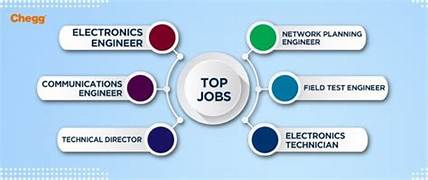Electronics & Communication Engineering Vacancies: Career Prospects and Opportunities
Electronics and Communication Engineering (ECE) stands at the intersection of modern technology and innovation. With the ever-growing digitalization and automation across industries, ECE graduates find themselves in high demand, not just in core electronics but also in IT, telecommunications, defense, manufacturing, and the government sector. This article explores the landscape of vacancies available to ECE graduates, the sectors offering promising opportunities, and tips on how to navigate these openings for a rewarding career.
1. Overview of Electronics and Communication Engineering
ECE is a branch of engineering that deals with the design, development, and maintenance of electronic equipment and communication systems. It includes fields such as:
- Analog and Digital Electronics
- Communication Systems
- Embedded Systems
- VLSI Design
- Signal Processing
- Wireless Communication
- Microwave Engineering
- Robotics & IoT
Due to this wide array of specializations, ECE graduates are equipped with versatile skills applicable to multiple domains.
2. Core Job Opportunities for ECE Graduates
The core sector remains one of the top priorities for ECE graduates. Vacancies often arise in roles related to:
a. Embedded Systems Engineer
Companies such as Intel, Bosch, Honeywell, and Texas Instruments regularly recruit for embedded systems engineers. These professionals work on hardware-software integration, firmware development, and device control systems.
b. VLSI and Semiconductor Design Engineer
The semiconductor industry is booming with companies like Qualcomm, AMD, Micron, and Broadcom offering positions in chip design, fabrication, and testing.
c. Communication Engineer
With the rise in 5G technology, there’s an increasing demand for engineers who understand network protocols, RF engineering, and signal transmission.
d. Electronics Design Engineer
These engineers work on developing electronic circuits and devices, often for industrial automation, medical electronics, or consumer devices.
3. Government Sector Vacancies
a. Public Sector Undertakings (PSUs)
Many PSUs recruit ECE graduates through GATE. Some of the key PSUs include:
- BHEL (Bharat Heavy Electricals Limited)
- BEL (Bharat Electronics Limited)
- NTPC (National Thermal Power Corporation)
- ONGC (Oil and Natural Gas Corporation)
- GAIL (Gas Authority of India Limited)
- IOCL (Indian Oil Corporation Limited)
Vacancies are typically for the role of Graduate Engineers, where the selection process includes GATE score + personal interview.
b. DRDO, ISRO, and BARC
These premier research organizations offer prestigious roles for ECE graduates:
- DRDO (Defense Research and Development Organization): Scientist B and Technical Assistant roles.
- ISRO (Indian Space Research Organisation): Recruitment through written exams for Scientist/Engineer SC.
- BARC (Bhabha Atomic Research Centre): Conducts its own Online Test for Scientific Officer positions.
c. Indian Railways
Vacancies for ECE engineers are available in:
- Indian Railway Signal Engineering Service (IRSEE) via ESE.
- RailTel and Metro Rail Projects like DMRC, BMRC, etc.
d. Other Government Departments
ECE engineers also find roles in:
- BSNL/MTNL: Junior Telecom Officer (JTO) posts.
- Indian Navy and Indian Air Force: Technical branches for maintenance and communication equipment.
- State Electricity Boards: For instrumentation and control roles.
4. Private Sector Opportunities
The private sector continues to be a massive employer for ECE graduates. Key areas include:
a. IT and Software Companies
Although IT is traditionally seen as a CS domain, ECE graduates are also eligible and frequently placed in:
- TCS, Infosys, Wipro, Cognizant – as software engineers.
- Accenture, Capgemini, Tech Mahindra – for IT support, coding, and testing.
- Startups – Especially those in IoT, wearables, and mobile communications.
b. Telecom Industry
India’s telecom boom means ample vacancies in companies like:
- Jio, Airtel, Vi, BSNL – for Network Operations, RF Planning, and Transmission.
- Telecom Equipment Manufacturers: Ericsson, Nokia, ZTE, Huawei.
c. Consumer Electronics
Companies like LG, Samsung, Sony, and Panasonic hire engineers for roles in R&D, product design, testing, and maintenance.
d. Automotive Industry
Automobile manufacturers are now tech-driven. ECE graduates can work on embedded systems, ADAS (Advanced Driver Assistance Systems), and infotainment systems. Companies include:
- Tata Motors
- Mahindra & Mahindra
- Bosch
- Continental Automotive
5. Emerging Fields for ECE Engineers
Technology is rapidly changing, creating new career avenues:
a. Internet of Things (IoT)
IoT devices are everywhere—from smart homes to wearable tech. Engineers with IoT skills are in demand for roles such as IoT developer, sensor designer, or network architect.
b. Artificial Intelligence & Machine Learning
ECE grads with coding and data skills can apply for jobs in AI/ML in industries like healthcare, fintech, and automation.
c. Robotics & Automation
Industrial and service robotics require both hardware and control system engineers. Companies in industrial automation like ABB, Siemens, and Fanuc hire regularly.
d. Cybersecurity & Networking
Understanding communication protocols is a great foundation for a career in cybersecurity, network security, and ethical hacking.
6. International Vacancies
ECE engineers are highly valued worldwide. Top global employers include:
- Intel, Nvidia, AMD, IBM
- Samsung, Huawei, Cisco
- NASA, Boeing, Lockheed Martin
Engineers often migrate to countries like the USA, Germany, Canada, and Japan after gaining 2-3 years of experience or completing a Master’s degree.
7. Higher Studies & Research Vacancies
Postgraduate degrees such as M.Tech, MS, or Ph.D. open up research-oriented roles in R&D labs, both in India and abroad. Fields of research may include:
- Wireless Communications
- VLSI and Semiconductor Devices
- Signal/Image Processing
- Biomedical Electronics
8. Teaching and Academia
With the increasing number of engineering colleges, there’s a steady demand for:
- Assistant Professors
- Lab Technicians
- Research Associates
Those who wish to enter academia can appear for NET/GATE and apply to reputed institutions.
9. Entrepreneurship and Startups
Many ECE graduates launch their own startups in areas like:
- Consumer electronics
- Embedded systems
- Mobile apps
- Tech consulting
- EdTech
Government schemes like Startup India, Make in India, and Digital India offer support to tech entrepreneurs.
10. Skills That Boost Employment Chances
ECE students should supplement their education with additional certifications and skills to increase their chances of landing top vacancies:
- C/C++, Python, Java: Programming fundamentals.
- MATLAB, LabVIEW: Used in signal processing and simulation.
- AutoCAD, ORCAD: For PCB design.
- Verilog, VHDL: For VLSI.
- CCNA/CCNP: Networking certifications.
- IoT, AI, ML, Data Analytics: Future-centric skill sets.
11. Where to Find ECE Vacancies
Job seekers can find electronics and communication engineering job listings on:
- Government Portals: UPSC, DRDO, ISRO, BHEL, BEL websites.
- Employment News
- GATE & ESE-related portals
- Job Portals: Naukri, Monster, Indeed, LinkedIn
- Campus Placement Cells
- Internship platforms like Internshala for freshers
12. Salary Expectations
The salary varies across sectors:
| Sector | Starting Salary (INR/month) |
|---|---|
| PSU | ₹50,000 – ₹70,000 |
| DRDO/ISRO | ₹60,000 – ₹80,000 |
| Private Core Companies | ₹30,000 – ₹60,000 |
| IT Companies | ₹25,000 – ₹50,000 |
| Teaching | ₹25,000 – ₹40,000 |
| Foreign MNCs | ₹1.2 Lakh – ₹2.5 Lakh |
Conclusion
The demand for Electronics and Communication Engineering professionals is expanding across traditional and emerging sectors. From government jobs in PSUs and defense to private tech giants and cutting-edge startups, ECE graduates have a versatile platform to launch their careers. By continuously upgrading their technical and soft skills, and staying informed about vacancies, aspiring engineers can secure rewarding roles and contribute meaningfully to the technological evolution of society.


